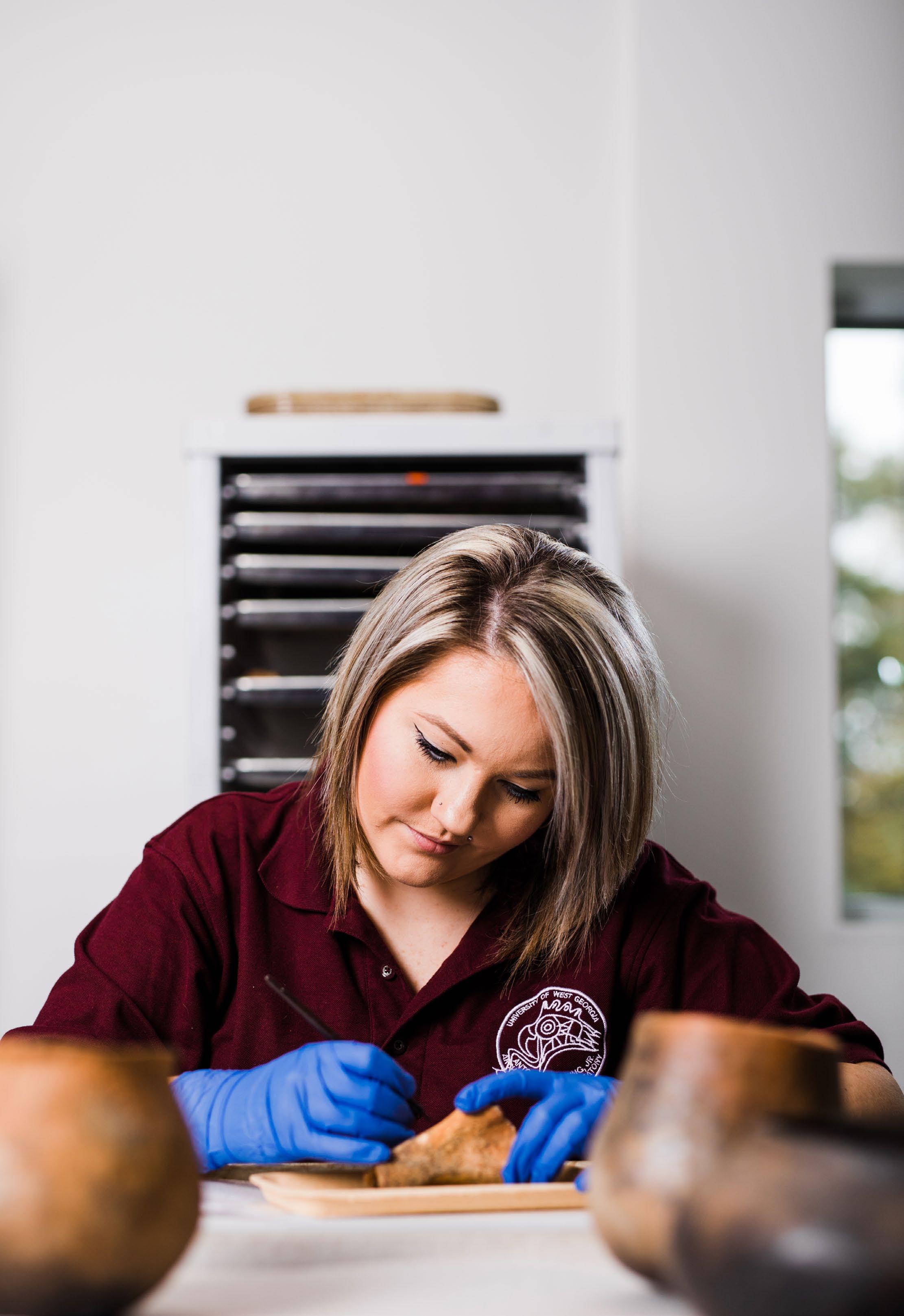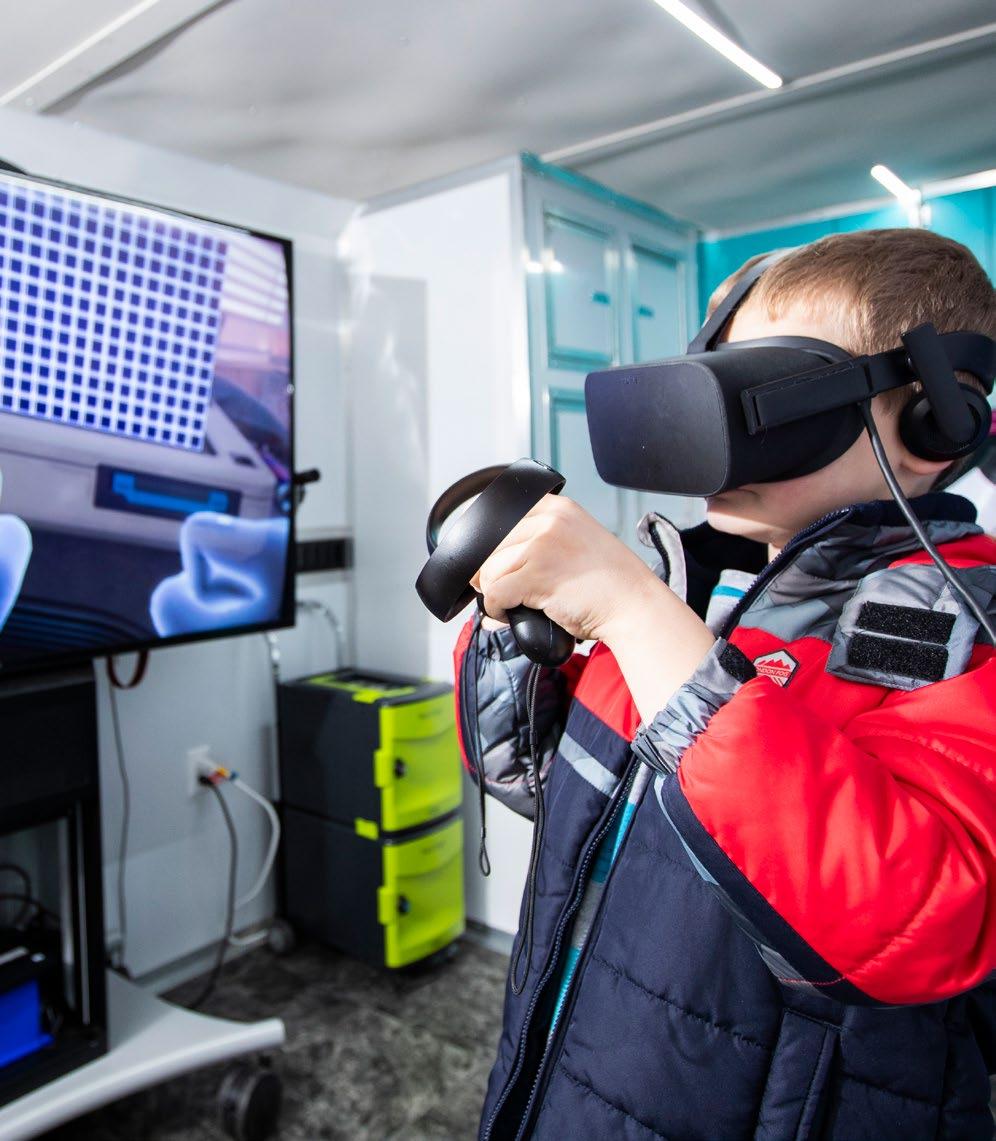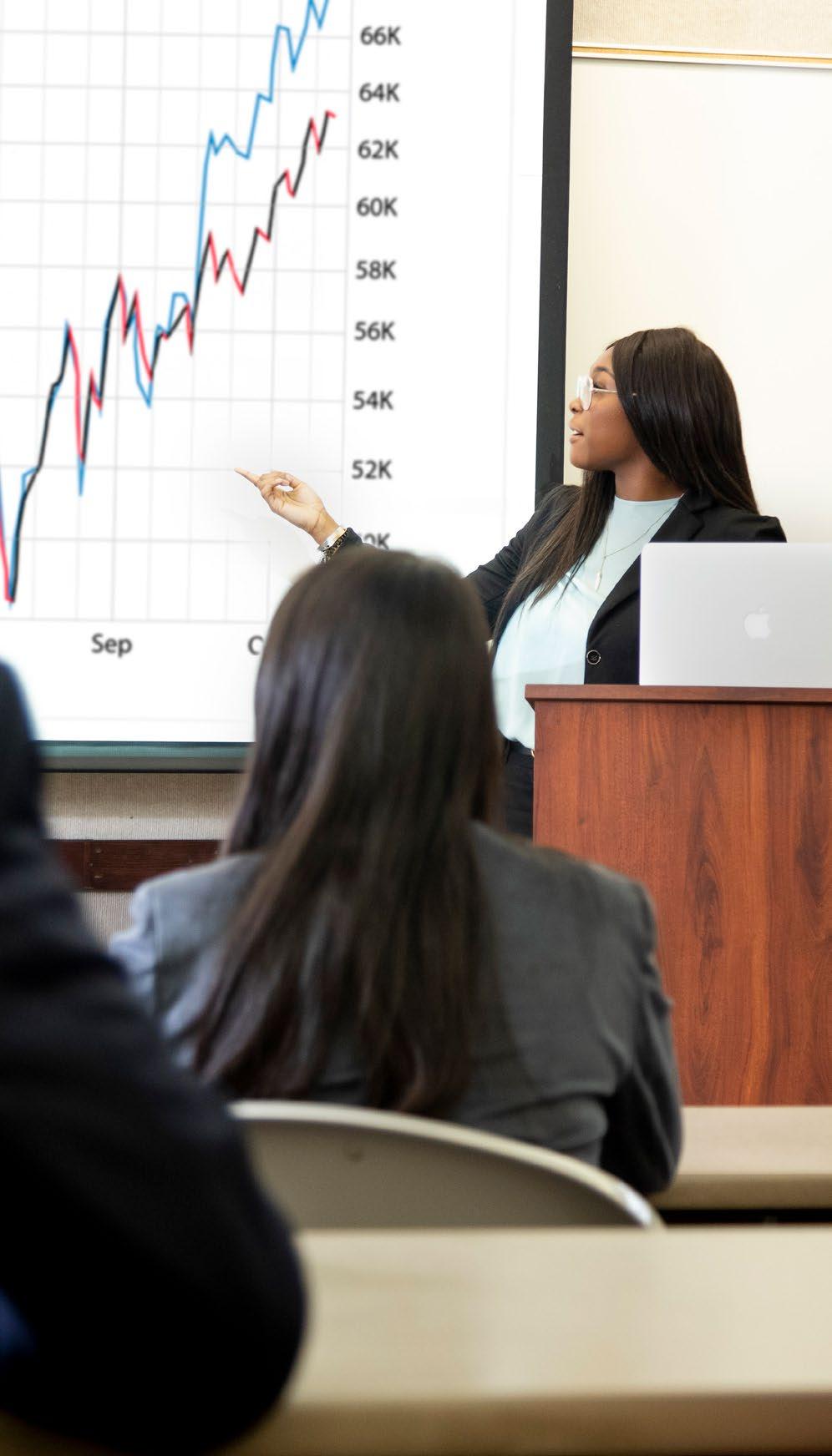UWG CENTERS & LABS REPORT





The Biological and Forensic Anthropology Laboratory (BAFAL) is excited to enhance student success through innovative, studentled research projects and dynamic community outreach events. This is accomplished by providing hands-on learning experiences that foster research skills, professional development, and community engagement. By partnering with local schools, hosting public events, and participating in international collaborations, we aim to inspire curiosity and a deeper understanding of anthropology and forensic science. BAFAL seeks to prepare students for future careers by offering enriching educational opportunities and creating impactful connections within our community and beyond.
Through Student Research Assistant Program (SRAP) funding, Lauren Hill and Ella Griffith gained invaluable experience through research and transferable skills, contributing to new opportunities for lab volunteers and visitors.

Lauren redeveloped the Human Evolution Workshop into a hands-on experience that teaches students about primate locomotion, encephalization, tool use, and more. The initial workshop invited 50 students to participate and serves as an ideal supplement to several core anthropology classes.
Ella used her exceptional artistic skills to create detailed drawings of pig skeletal elements. These drawings will be used to develop skeletal analysis worksheets for the Pig Dig course, a simulated crime scene that teaches methods in forensic and biological anthropology. Ella envisions a novel approach to inspiring students about the human skeleton by evoking wonder and curiosity through the use of shock, fear, and disgust, rather than traditional, sterile methods. Her work will be displayed in a curated exhibit at BAFAL and will be restructured for Human Osteology classes as lab stations, enhancing students’ understanding of functional osteology for years to come.
The Antonio J. Waring Jr. Archaeological Laboratory (Waring Lab) at UWG is a premier academic research facility dedicated to curation, research, community engagement, and interpretation. Renowned for its exceptional curation standards, the lab preserves archaeological and historical collections for local, state, and federal agencies, offering extensive hands-on training for students. Its interdisciplinary research spans traditional and experimental archaeology, providing students with rich, long-term project opportunities. Community engagement is a cornerstone, with the lab actively participating in public events, educational programs, and on-campus activities, while its interpretive operations develop museum exhibits and other projects that enhance public understanding of archaeology.

In Fiscal Year 2024, the Waring Lab achieved significant milestones, including completing 38 curation projects, receiving nearly $200,000 in grants for Native American Graves Protection and Repatriation Act -related work, and participating in 39 community engagement events reaching almost 5,000 individuals statewide. Recognized with the UWG Community Connection Award, the lab also collaborated with several universities and the Muscogee (Creek) Nation on preservation efforts at Ocmulgee Mounds National Historical Park and began investigations at the ancestral site of Miccosukee Town with the Seminole Tribe of Florida. These efforts align with the lab’s mission to facilitate the study and preservation of Georgia’s archaeological heritage, engaging with diverse communities to promote public knowledge and appreciation of the past.
Established in 2000, the Center for Public History at UWG has been instrumental in research and professional development in public history. It supports the art, history, and philosophy programs, enhancing students’ understanding of history within a liberal arts framework and preparing them for careers in public humanities. The center has supported nine graduate research assistants (GRA), with funding from entities like the Atlanta History Center and the Aviation History and Technology Center. It has also provided opportunities for undergraduate research, such as a project focused on the Textile Trail, and boasts alumni working in significant roles like an archive technician for the National Park Service.
The center’s key projects and partnerships include collaborations with the National Park Service, Atlanta History Center, and regional museums. Recent noteworthy initiatives include the Local History Project, led by GRA Noah Dropp, and the Oral History Project, which documents regional histories. The center has engaged in multiple cooperative agreements with the National Park Service, initiated new collaborations with Tallapoosa’s West Georgia Military Museum, and partnered with the Southeastern Quilt and Textile Museum for exhibitions. Ongoing projects like the Textile Trail Initiative involve community engagement and partnerships, ensuring continued success and strong career placement for students in the public humanities field.




The College of Education’s Innovations Lab and Mobile Innovations Lab at UWG exemplify the university’s dedication to student success, innovation, and community engagement. These labs provide training and access to emerging technology for classroom and community use, serving as a hub on campus and a mobile resource for local schools and educational events. Over the past year, the Innovations Lab has supported over 1,900 visitors, including students, faculty, staff, and local educators. The Mobile Innovations Lab has reached more than 2,100 K-12 students across several counties, involving student workers and volunteers in real-world educational experiences. As these labs continue to evolve, they remain committed to fostering collaboration and sharing innovative technologies with the community.

UWG’s Center for Economic Education and Financial Literacy (CEEFL) is dedicated to empowering teachers, students, and community members with the knowledge and skills necessary to master personal finance and economic thinking. Guided by UWG’s core priorities of relevance, competitiveness, and placemaking, CEEFL plays a crucial role in providing a holistic education. By developing research-based curricula and delivering training workshops both locally and internationally, CEEFL ensures that educators remain at the forefront of economic education, enhancing their relevance and competitiveness in a rapidly evolving educational landscape.
Moreover, CEEFL’s commitment extends to educating P-20 students, from preschool to workforce, by offering comprehensive financial education resources that pave the way for their success in a dynamic world. Beyond the classroom, CEEFL connects with the West Georgia community and its surroundings, fostering well-informed, fiscally conscious communities through robust partnerships with local groups and organizations. This multifaceted approach not only enhances individual financial literacy but also strengthens the overall economic well-being of the community, aligning with the center’s mission to serve teachers, educate students, and connect to the community.
The Carrollton office of the Small Business Development Center (SBDC) at UWG has made significant strides in 2023, completing a schedule of 24 classes, including the successful Women in Business Summit. The office has been instrumental in supporting local entrepreneurs through the West Georgia CEO Roundtable and the Villa Rica Rise and Shine panel. Throughout the year, the office facilitated 26 business starts and assisted clients in securing $24 million in capital acquisitions.
The team’s outreach included numerous programs and classes aimed at business development, such as digital marketing sessions in collaboration with the Newnan-Coweta County Chamber and the Small Business Loans Deciphered class delivered by consultant W. Troy Vollenweider. Additionally, the office maintains robust connections with the SBDC International Trade Department, co-consulting on multiple international trade projects and planning an exchange program with India.

The Thomas B. Murphy Center for Public Service at UWG is a nonpartisan, educational organization dedicated to fostering civic engagement and public service. It offers unique and enriching programs designed to educate students and the community about real-world politics, public affairs, and government. Through these efforts, the Murphy Center equips individuals to become active leaders in their local, state, national, and international communities. By partnering with students, faculty, and community stakeholders, the center addresses and influences political, economic, and social issues.
The Murphy Center’s impact is evident through its robust event calendar and the distinguished lecture series, which features notable speakers each semester. Highlights include a lecture on Modern Cronyism in Georgia by Professor Ken Wheeler of Reinhardt University and a Commemoration Celebration for Speaker Murphy’s 100th birthday, which drew several local and state officials. Other significant events included a lecture by former U.S. Attorney and Georgia State Representative BJay Pak and Associate Dean and Professor at UGA Dr. Marshall Shepherd.

The LeadershipUWG/Murphy Fellows program exemplifies the center’s commitment to developing future leaders. In 2023, five students were accepted into the program, participating in various leadership development activities and networking opportunities. These included meetings with influential figures such as legislators, lobbyists, and business entrepreneurs. The program culminated in April with the students’ graduation, marking another successful year of cultivating civic responsibility and leadership.



The Center for Integrative Wellness (CIW) at UWG is a key initiative that underscores the university’s commitment to holistic well-being and community support. Highlighting this commitment, CIW has made significant strides in addressing food insecurity on campus, achieving a 21% reduction through efforts like the Wolves Don’t Waste program, which repurposed over 5,000 pounds of food into nearly 5,500 meals for students and staff.
A standout feature of CIW is its innovative mobile health unit, envisioned by alumna and Chief Wellness Officer Bridgette Stewart. This medical clinic on wheels brings essential health services directly to underserved communities around Carrollton, overcoming barriers like lack of insurance, transportation, and financial constraints. The mobile unit is equipped with biometric screening stations, a portable kitchen, and an expandable awning, allowing it to offer high-quality, cost-effective wellness programs anywhere they’re needed.
The mobile unit not only benefits the community but also provides UWG students with handson learning opportunities. Known as the Screen Team, these students conduct various health screenings and gain valuable soft skills through direct interaction with the community. Additionally, the unit offers community-based health education, including CPR and first-aid training.
The mobile unit’s capability of supporting disaster response, vaccination clinics, and blood drives exemplifies the university’s proactive approach to health care. Partnerships, like the ones with Cobb & Douglas Public Health, further extend its reach, enhancing access to preventive services and fostering a healthier community.

